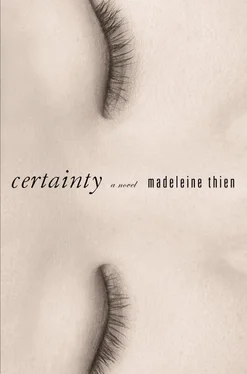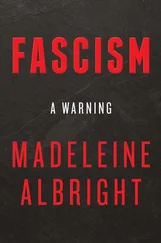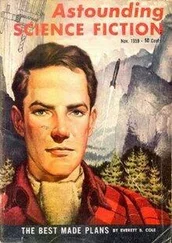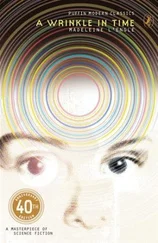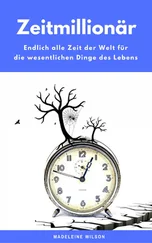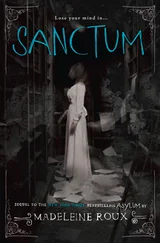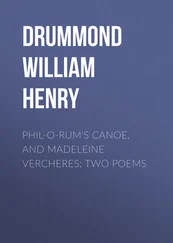Afterwards, he remained by the window while she drifted to sleep. So many voices rose up, carried by the heat and air, a ghostly sound, moving against the walls.
In the house, the phone rings. Gail does not start, but Sipke’s hands jump out in front of him, instinctually, towards the sound. He takes the receiver, turns his face to the darkened window. “Sipke Vermeulen.”
It is Joos, from the farmhouse down the road.
Gail stands up, puts her hands on her hips and tilts her upper body to one side and then the other. She walks into the kitchen. Sipke can hear the refrigerator door opening and swishing shut. Two glasses filling with water.
He finds himself in a rambling conversation with Joos about a kind of bird that seems to have disappeared from the Netherlands. “We saw them when we were boys, didn’t we?” Joos says, in his usual mournful voice. “ Ooievaars , swooping across the fields. And now they’ve disappeared to some other country. Probably Norway or Canada, like everyone else. Even so, this country is so crowded, Sipke. When we die they will have to bury us standing upright.”
After he finally manages to comfort Joos, Sipke asks Gail if she would like to go for a walk. Smiling, she agrees, and they bundle themselves in big coats and pull on woollen toques. Outside, there’s the sound of wind moving through the banks of reeds and the swaying alders. As they walk, he tells her that Wideh lives in Jakarta now. “He is a photojournalist. Perhaps, later on, you would like to see some of his work.”
“Yes, I would love that.”
A light snow begins to fall. Gradually, she tells him about her documentaries, about Ansel and the life that they share in Vancouver.
“And your Ansel,” Sipke says. “He also works in radio?”
“He’s a doctor, a pulmonary specialist.”
“Ah, wonderful. And you have children.”
They curve along the water’s edge. “No, not yet.”
“One day?”
“Maybe one day.” His questions seem to relax a reserve in her and she begins to talk. She tells him that she had seen his letter one day at her parents’ house, the letter telling her father of Ani’s death. “Hers was a name my parents both knew,” Gail says, “and between them, it seemed to have a meaning, a weight.”
She says that she held on to the memory as if it were a touchstone, something that could anchor her. She knows, has always believed, that there is a secret that has coloured her life, her childhood. In the last few months, she has felt as if, day by day, she is losing her footing. There are fissures, openings, that she no longer knows how to cover over.
They are surrounded by darkness, lights from the distant farmhouses just visible. Her face, so reminiscent of Wideh, is filled with yearning.
“And so you came here,” he says, “looking for an answer to your questions.”
For a long time, she looks at the ice that is beginning to form in the canal, the silvery sheen of the surface. “I don’t know,” she says, finally. “Perhaps I’m looking for an answer that isn’t real. That doesn’t exist.”
He closes his eyes, opens them again, sees the snow disappearing in her hair.
They continue walking, and their path takes them back along the road, past the sweep of farmland that divides each property here. They come in sight of Sipke’s house, where he has left a single light burning.
Inside, after they have shed their layers of coats and scarves, Gail tends to the fire. Then, he and Gail sit down once more, across from each other at the kitchen table.
Between them, Sipke has laid out a handful of black-and-white photos: the studio, Ani and Wideh at the harbour in Sunda Kelapa, the canal that runs along Jalan Kamboja. He tells her that, by mid-1965, Indonesia was on the brink of collapse. Sukarno was ill, it seemed. Possibly dying. Already the speculation was rife as to which faction – the army, the Communists, or Darul Islam – would set the inevitable coup in motion. Sipke’s request to extend his residence permit had been denied, and he had been given three months to leave the country.
“It was in June of that year,” he says, “when Ani received a letter from Canada, from your father, saying that he wished to see her.”
Sipke watches Gail as he speaks, more than anything not wanting to injure her. All her movements are stilled, but she does not look away.
“Some time later, Ani told me something that I’ve always remembered. She said that it was your mother who had encouraged your father to travel to Jakarta. She asked him to go, to find what he needed to know, believing that the truth was capable of bringing about a change in all their lives.”
Gail picks up a photograph from the table, and in her hands it appears fragile, aged, the edges curving up.
The photo catches the light, and Sipke sees Wideh, just a child, kneeling on the ground in Ani’s apartment in Jakarta, carefully setting up a game of marbles. His hands reach out towards the small glass spheres, but the aperture is narrow, and only his face is clear and in focus. In the foreground, the marbles blur like stars. Gail lifts her face, meeting his eyes, and she holds his gaze silently. What he sees in her face is not hurt, not anger. Her expression reminds him of Wideh’s face on the day Sipke taught him to develop his own negatives, how the boy had clutched the film in his hands, watching the lines come clear, grow together. As if a shadow, a darkness, was becoming more than its form, as if something barely glimpsed had now been breathed into life.
After a moment, she says, “How old is Wideh now?”
“Next month he will turn forty-five.”
At first, because she does not respond, he thinks she has not heard him. But then she sets the photo down. Outside, the snow has painted the darkness white. He can hear the low whistling of the wind.
“When I was a child,” she says, “my father had just one ritual. He would gather us into the car each Sunday, my mother in the passenger seat and me in the back, and we would drive away from our house, towards downtown, the ocean. He loved the city at night. When he was a student at university, my father studied history. He thought he would teach one day, but that never came to pass. The books are still there on the shelves, remnants of a different life. As we drove, he would keep up a running commentary, proudly pointing things out to me, to my mother. Naming the landmarks, wanting us to see the things he saw.”
He reaches out his hand, and rests it on hers.
She says, “You said you would show me Wideh’s photographs.”
He gets up and leaves her for a moment. When he returns, he has an archival box containing tear sheets and prints, and he sets it on the table.
She rests her hands on the lid, but she does not open it. Exhaustion seems to shape the air around her.
“It’s late,” he says. “Perhaps we should rest.”
“Yes.” She is lost in her own thoughts. He can see her as a child, the car that winds back through the city, the same roads traced and retraced.
“Tomorrow, there is a place I would like to show you. I used to go there often with Ani and Wideh, a long time ago. It is called Schokland, and in the past it was an island, surrounded by the sea.”
Slowly they gather the cups and dishes and set them in the sink. She smoothes the cloth on the table, then, leaning forward, her face young in the candlelight, she blows out the flames.
Sipke finds a place by the windows. When he closes his eyes, the morning humidity of Jakarta sits heavily, once more, on his skin. Outside, the first calls of the vendors are audible, the ringing of bells, makeshift carts clattering over the sidewalk.
That day when the letter from Matthew Lim arrived, Sipke had asked her what it was that she wished to do. “I don’t know,” she had said, over and over. But, along with the surprise that he saw, there was a thread of hope running through her, so fine as to be almost invisible. He could not help but see it.
Читать дальше
